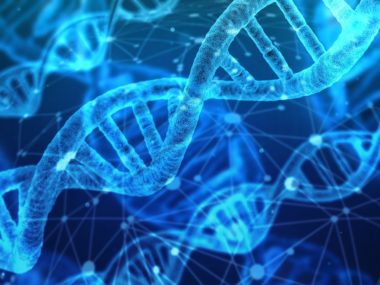Many Christians tend to dismiss the idea of significant biological change over time. Yet interestingly, significant biological change does occur, and sometimes very rapidly.
This article has been reblogged with permission from Creation Unfolding. The views expressed in this article reflect those of the author, and not necessarily those of New Creation. Some terms in this article have been updated to reduce undue confusion and misunderstanding.
Consider the two dog skulls below. The smallest belongs to a Chihuahua, and the largest to a Great Dane. Both dogs belong in the same species yet notice the variation in their skulls.

The most obvious difference is in the size of the skulls. The Chihuahua’s head is tiny in comparison to that of the Great Dane (I love the photo of the Chihuahua’s skull nestled into the underside of the Great Dane’s jugal bone). Other major differences are readily apparent. The muzzle in the Great Dane is far longer, while in the Chihuahua it’s barely noticeable. Perhaps one of the most important contrasts is found in the cranial bones. Notice the external sagittal crest of the Great Dane compared to that of the Chihuahua. The crest is completely absent in the Chihuahua (which actually has a hole in its head!).
These changes become even more dramatic when we consider the rate at which most dog breeds diversified—over a period of about 300 – 1000 years. It is true, this isn’t natural selection, it is breeding, but when we conceive of such dramatic change in such a short period of time, the possibilities are intriguing.
Scientists have taken account of the astonishing rate of dog evolution. Secular researchers Drake and Klingenburg1 concluded that shape variation for the skulls of domestic dogs and Carnivora (all cats, bears, and, hyenas) is comparable! Yet Carnivora, as a group, supposedly evolved over a period of 42 million years!
Christians should be excited about this kind of rapid change within organisms! Many creationists now believe that most of the mammal families we have with us today diversified from very different looking ancestors that disembarked the ark just a few thousands of years ago.
When creationists denigrate rapid, and sometimes extensive diversification, they are maligning the amazing genetic diversity that God Himself ordained from the very beginning. And no, I’m not condoning that man evolved from apes, or the philosophical system known as “Darwinian evolution.” That kind of accusation is often a knee-jerk reaction to a perceived attack on the Bible. The Bible has nothing to say, either for or against, rapid diversification of organisms, although it does provide criteria that limit that diversification.
So, let’s embrace rapid and sometimes extensive diversification, being careful to keep within the bounds of Scripture, but not so careful that we deny observational science.
Footnotes
- Drake, A.G, and Klingenburg, C.P. (2010). “Large-Scale Diversification of Skull Shape in Domestic Dogs: Disparity and Modularity.” The American Naturalist, vol. 175, no. 3. ↩︎












Dog breeding is not evolution! They are all still dogs. Further, breeding requires intelligence, something that is incompatible with the theory of evolution.
This article is horribly written. It is in my opinion purposely misleading. So much so that I truly believe the true intention of this article is for the people of the world to point to this organization and say ” See, Christian’s now believe in evolution!” What you have done in this article is correctly described micro evolution. Which is true and something that God did design. but you’re conflating it with macro evolution. Macro evolution is a lie. And denies that God is our creator. Shame on you. You can and we do deserve better.
Hello Brock,
It is always important to understand the context in which a word is being used by a speaker/writer in order to avoid unnecessary confusion. It’s true that evolution can be used as sort of “catch all” term that encompasses a wide variety of concepts, including the idea that all life evolved from a common ancestor billions of years ago. However, using it this way can lead to confusion since people who study this field do not necessarily define it that way. Usually, evolution refers to “change in the heritable characteristics of biological populations over successive generations.” This is how the author, Dr. Coulson, defines it above. While some evolutionary concepts clearly go against the Creation account and should be rejected (e.g. man from non-human primates or birds from non-avian dinosaurs) there is nothing unbiblical about evolution in its simplest form: change over time.
Hi Brock,
I’m sorry that you feel that way. My intention is not to pander to the world. If I wanted to do that, I would be a theistic evolutionist, not a creationist. My intention is to move beyond terms like micro and macro evolution. Micro evolution, at its basic level, means changes in allele frequencies over time, like when finches get larger beaks. Micro evolution is thus testable and observable. Macro evolution is everything else that supposedly happens when micro evolution is extrapolated over time, typically millions of years. As such, macro evolution is not subject to observable, testable science (in terms of experiments in labs). This also means that “macro evolution” can encompass a huge range of biological change from the evolution of the horse to the evolution of humans (which, I of course, reject). And yes, the evolution of the horse must be viewed in terms of macro evolution. Natural selection (or micro evolution) in and of itself does not provide answers as to how the horse changed so drastically. How do so many anatomical parts like eye sockets, jaws, teeth, feet, skull, and dozens of other parts, change in concert with one another. That’s the key by the way, “in concert with one another,” or, one anatomical part changing in response to the change in another anatomical part. This requires more than just Natural Selection (micro-evolution). Something else was going on genetically with these animals. And, given the account of Noah’s Flood and a world that was completely changed, this, of course makes perfect sense. How else would creatures adapt in this new world unless they could change, perhaps significantly? Did God provide a 10,000-mile row of eucalyptus trees all the way to Australia for the lumbering Koala when it got off of the ark? Obviously not. Each animal must have been pre-programed (by God) to change in accordance with this new world (and no, not by mutations over millions of years). The evolution of the horse is a perfect example. It went from being a dog-sized, multi-toed creature into what we see today with the modern horse: quite a change. And that’s not just my perspective. I’ve attached a photo of this horse as it is portrayed in at the Answers in Genesis Ark exhibit. Look, I get it Brock, we speak about “evolution” and we get alarmed. But I am not a covert theistic evolutionist. I am a Christian who loves Jesus Christ, and loves the creation, but who sees obvious inconsistencies in the creationist world view. I apologize if you have been offended. That is not my intent. God bless, Ken Coulson
(I guess I am not able to attach that photo as I can’t find a link).
When I read the title I expected a discussion of whether a Cristian can believe in an old earth and evolution as most biologists understand it. While dog breed size variation is impressive, it artificial and both size and shape are small compared to the array of fossils found all round the earth.
Hi Ronald,
Thank you for your comment. You make a very good point. Yet, small-scale changes such as these are often used by evolutionists as evidence for the theory of universal common ancestry. It is important to differentiate between these two types of “evolution.” Science demonstrates that changes can occur within an animal kind, yet this is not valid evidence for universal common ancestry.
What is your understanding of the special phrases in the Bible as follows:
1) Gen1.20 “Let the waters bring forth creatures having life, and let birds fly above the earth” (Day 5)
2) Gen 1.24 “Let the earth bring forth the living creature according to its kind, the quadrupeds, the creeping things, and the wild animals of the earth according to their kind.” Day 6
You do understand “evolution” in the way it is presented in schools and textbooks, right? Basically, everything evolved from some “primordial soup” from a single cell, over billions of years? Cmon man. Get your money back from that education you paid for! When you show me that an ape can mate with a shark, or a frog can mate with a bird, then I will believe in “evolution” as its being taught. Please stop trying to show the differences in the same species as “evolution!”
Hi Mike. Yes, and I agree with you that evolution as it is taught in schools is obviously not true nor biblical. Now we just have decide what terminology to use to describe the kinds of change we see in post-Flood animals. “Evolution” just means change over time. And perhaps it isn’t the best word to use. So let’s use the word “diversification.” Is it possible that some rather dramatic kinds of “diversification” have occurred? I think the answer is yes. See this YouTube discussion by Todd Wood and Paul Garner regarding the “diversification” of the horse. Hope this helps. https://www.youtube.com/watch?v=ZtDvd7mcAQg&t=1906s
In a sense most controversies around Christian doctrines and beliefs are about the authority of words and definitions. Evolution is a heavily overloaded word, but in the context of science it invariably means, or is synonymous with, incredible claims of transmutation across genus boundaries through deep time.
As has been said elsewhere ‘evolution’ in the most general sense as ‘change over time’ means almost nothing. To demonstrate the problem consider the fact that anti-creationists routinely use this as a bait-and-switch to good effect: “Oh, you believe in evolution, what’s your problem then?”.
I cannot see how the creationist cause can be benefited by embracing this widely used, convoluted and loaded terminology. I appreciate that creationist academics can be steeped in evolutionary literature and still maintain a creationist position, however, it must be appreciated that words have immense power to steer dialogue and opinion in the marketplace of ideas.